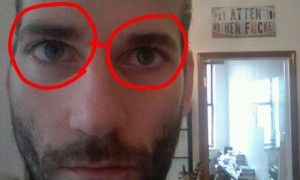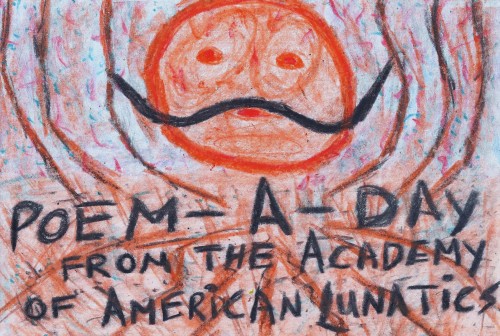Daniel Beauregard Release Day Interview Party!
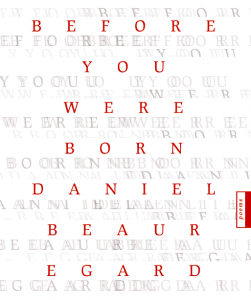 Today, my new press, 421 Atlanta, releases Daniel Beauregard’s debut chapbook, Before You Were Born. First things first: you can order it here, or here if you want to get a great deal on both it and Publishing Genius’s newest chapbook release, The Kids I Teach by Andrew Weatherhead and Mallory Whitten. Speaking of Publishing Genius, I thought I’d take a page from PGP man (& BYWB designer) Adam Robinson’s playbook and post a quick but savory Q&A with my author so that HTMLGiant readers can get to know him a little better! It was really interesting to think about Daniel’s poetry as an interviewer instead of as a publisher, and I was very excited to see his thoughtful and candid answers to my questions. And here they are!
Today, my new press, 421 Atlanta, releases Daniel Beauregard’s debut chapbook, Before You Were Born. First things first: you can order it here, or here if you want to get a great deal on both it and Publishing Genius’s newest chapbook release, The Kids I Teach by Andrew Weatherhead and Mallory Whitten. Speaking of Publishing Genius, I thought I’d take a page from PGP man (& BYWB designer) Adam Robinson’s playbook and post a quick but savory Q&A with my author so that HTMLGiant readers can get to know him a little better! It was really interesting to think about Daniel’s poetry as an interviewer instead of as a publisher, and I was very excited to see his thoughtful and candid answers to my questions. And here they are!
How did dreams, objects, and found texts interplay with your process in writing the poems in your new chapbook?
Dreams played a very large role in writing the poems found in “Before You Were Born.” In a way I feel many of the poems were dictated to me through my subconscious—at times I woke in the middle of the night after a dream and the dream became the poem. Other times, things came more sporadically, a line at a time. When I added the lines together they made sense. Or they didn’t. I have a dry erase board next to my bed and if something comes in those hours between waking and dreaming that is important to me, I straggle out of bed and write it down usually without turning on the light. Then I go back to bed or, if the lines keep coming, I’ll turn the light on. Objects played a large role in writing the poems as well. I was obsessed with the way things can be continuously broken down then built into something new. Like an atom bomb or a pulsar. I didn’t rely on found text in these poems as much as I have in my more recent work. However, there are a lot of bits and pieces I’ve picked up along the way that have wedged their way into the poems—conversations, arguments, emails.
And how about The Simpsons?
The Simpsons is always somewhere inside me D’oh. There aren’t many references to the show in “Before You Were Born” but I did steal a line from Superintendent Chalmers. It’s from a scene when Chalmers and Principal Skinner are walking in the parking lot and Chalmers shows Skinner his new car. Skinner says: “It gets me to from A to B—and on weekends, point C.” I do have several other poems that reference the show though.
There’s something about the poems in Before You Were Born that seems, not personal exactly, but private. How do you think about audience and the reader?
There is something that’s a little private in those poems because, in a way, it’s asking the reader to take a step into my mind—to see the things that I obsess over; the things I rant about. Tiny particles. Dust being bits of skin. Swamp lights and the souls of dead children. I don’t like to think about the audience and the reader too much. I like the idea of the reader looking into a glass house. You can throw whatever you want at it but the house will stand or melt into something else, all the while a part of me will remain. These poems are an exercise in understanding myself—they are very much selfish.
What are you working on now?
Lately I’ve been interested in how caves can be used as a larger metaphor for language. I haven’t thought too much about it yet but I’ve begun studying caves via various texts and hopefully over the next few months I can visit some caves myself. I’m interested in how life can thrive in the depths of these caves without any sunlight—bacteria, viruses, extremophiles—not exactly sure where it will go but I’ll continue playing with the idea of desiccation, dissolution and creation. I’ve also got another project titled “HELLO MY MEAT” that I finished recently. It’s a series of loose sonnets created from words and phrases found in various anatomy texts, letters from sea, captain’s logs, butcher manuals and sea diaries from the early 1900s.
u mad bruh?
i am so not mad
like, at all
like, this is the most fun the lit scene has had in minutes
i mean, have you ever been to a poetry reading?
long live mellow pages!
who do you want to see step in to fill the gap and sponsor mellow pages?
here are my top choices:
1. Hot Topic #teen #mellowgoth
2. Haliburton
3. Red Lobster
4. CHANEL
5. ‘Bojangles Famous Chicken n Biscuits’
6. Sephora
7. Anshan Heavy Duty Mining Machinery Co Ltd
8. Fuddruckers
THE GOOD GHOSTS OF SNAPCHAT
I don’t know if you have realized it, but if you look carefully at The Dick Van Dyke Show, you might notice that the star-couple does not share a bed. In fact, married couples did not sleep in the same bed until 1952 on American television, which is totally ridiculous. [1]
Things change in our culture and many weird things we are unsure we want to welcome suddenly become our reality. Here comes the Verysmartphone 5.3, with all of the internets for you to have and carry with all the time! The facebooks, the twitters!! Everything. And ew, you have Snapchat? What are you, a weird pedophile or, like, a huge slut?
Well I am neither, and I love Snapchat.
My entire immediate family lives in a country far, far away, in a small place called “Greece.” I don’t get to see them often, so it was great to have my mom and sister come visit over Christmas. We fought so much! It was amazing. But also, I made my sister download Snapchat. This has been the best thing for our relationship since I have emigrated from Greece and away from my family.
My sister is the kind of person who does not use social media the way I do. It is not a place for her to bitch about how adulthood is probably when you start washing your french press before you need to reuse it. We have a different sense of what is publicly acceptable as an extension of one’s self. This is where Snapchat comes in, I think. She is no longer preoccupied with appearing a certain way, even to me. There is a vehement liberation from the anxiety or stress some feel over the perfection a “permanent” record of a picture or note “must” leave; it is a weird empowering liminality that arrives with the immateriality of the Snapchat application.
An important detail to emphasize is that my sister is also not the kind of person to gchat or verbally engage with me meaningfully online. She might be more of a visual communicator. I do not know for sure, but that is what the past month has shown me. And I am so happy in this little unimportant—yet so, so important—discovery. I can look at the video she sent me of her walking towards her boyfriend’s Ducati, and I can feel close to her. I still haven’t met her boyfriend, but I kinda know how he makes her feel and this technology has given me a sense of intimacy I didn’t know was possible. (Sister’s boyfriend is also the President of the Ducati Club in Greece, and for that alone, from my standpoint, they’re meant to be!)
With Snapchat, my sister can have separate beds in a public sphere, and if that is what she wants it should be respected. But it is nice to no longer feel as away from her as I really have been.
[1] First shared bed thing was actually in 1947, but the couple was married IRL and it was before TV was really TV, just in case someone wants to split hairs.
The Persistence of Crows
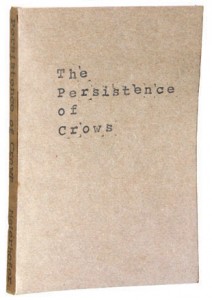 The Persistence of Crows
The Persistence of Crows
by Grant Maierhofer
Tiny TOE Press, 2013
173 pages / $12 Buy from The Open End
Coming of age narratives are usually as riddled with tropes as low-budget horror films. Sure, there are a few outstanding novels in the genre like Bret Easton Ellis’ Less Than Zero and Anthony Burgess’ A Clockwork Orange, but the list of must-reads grows at the speed of stalactites. Grant Maierhofer’s The Persistence of Crows, from Tiny TOE Press, has joined that short list with a story full of depression, too-beautiful moments, and kind of soul crushing realness.
Henry Alfi is a young man who’s recently stopped using drugs and alcohol. Sadly, his new unaltered state of consciousness has him feeling bored, lonely, and profoundly disenchanted by the people and institutions that surround his life in the Midwest: AA, friends, college, family, the women he dates, etc. One of the few things Henry enjoys is writing, so a trip to New York with his college newspaper seems like the perfect opportunity to get away from everything for a while and ponder the future. Surprisingly, the trip turns out to be more than an escape and Henry finds himself ready to move, eager to discover the world, sure that he wants to pursue a career in writing, and falling quickly in love with a woman who shares his view of the world.
The Persistence of Crows starts out as an unimpressive narrative about a young man about to embark on a trip to NYC. Despite the lack of an exciting start, Maierhofer manages to set the hooks in via his use of language and character development. The strategy is risky, but he pulls it off. The prose has a unique, somewhat offbeat rhythm and the dialogue is sharp. Also, he establishes early on that his main character is deeply flawed but also thought-provoking and the kind of individual you want to learn more about:
“It felt better to be walking by myself. I didn’t feel unsafe when I was alone. I didn’t care if some bum crept up to me. I would fight and what would happen would happen. It was when I was with others that I got nervous. It’s far easier for me to imagine defending myself than it is protecting the life of somebody else. Their life can be completely abstract even if they’re standing right next to you.”
Henry is the poster child for the broken/dissatisfied/irritated/Google generation. He feels alienated, gloomy, and deracinated despite being home. His life on drugs and alcohol was bad, but his life without them isn’t better. The story seems to be a character study for a few chapters because the dark past, recent troubles, and disturbed state of mind are all in place, but it changes drastically once Henry lands in New York. A bit of dark humor and pervasive dreariness quickly switch to a beautiful homage to the Big Apple in which Maierhofer’s knack for language and imagery take center stage:
“The rain beat down on all of us. These youthful faces soaked in the same Hudson River breeze as the old folks arm in arm enjoying the bright lights of the city. I was surprised to see that even in the afternoon the lights shone as brightly as all of the photographs I’d seen of the city at night. When I turned the corner, all breath was taken out of me. Any worry I had ever felt in my entire life up until that point turned into a sense of power as I stood there staring at the gray and red and silver world encircling me.”
The homage to NYC saturates the narrative for most of the middle third of the novel, which contains a few odd encounters between Henry and locals that deserve to be in film, and eventually bleeds into the brief but magical time Henry spends with Sara Lee Poe, a fellow journalist he meets at a panel. The duo allows the city to filter everything they experience together and they weave a cocoon of shared ideas and passion that blinds them from their imperfections. As soon as their time together is over, reality comes crashing in and Maierhofer uses it to destroy both everything Henry built and readers’ emotions.
The Persistence of Crows switches between a romance, a bizarre comedy, and something that pulls from most of Woody Allen’s early work. It is an exploration of loneliness, addiction, the construction/obliteration of love (or at least a reasonable facsimile), and disconnection. Maierhofer’s Henry thinks trying to pay attention to what others have to say can only lead to suicide, but he ends up contemplating suicide because of things that were left unsaid. Stories about falling in love in oh-so-magical New York are as old as the city itself, but Maierhofer has updated the premise to offer the honesty and ugliness that fans of authors like Tao Lin, Ana Carrete, and Sam Pink demand, and the result is worth a read.
***
Gabino Iglesias is a writer, journalist, and book reviewer living in Austin, TX. He’s the author of Gutmouth (Eraserhead Press) and a few other things no one will ever read. His work has appeared in The New York Times, Verbicide, The Rumpus, HTMLGiant, The Magazine of Bizarro Fiction, Z Magazine, Out of the Gutter, Word Riot, and a other print and online venues. You can reach him at gabinoiglesias@gmail.com.
January 10th, 2014 / 11:00 am
GO TO WORK AND DO YOUR JOB. CARE FOR YOUR CHILDREN. PAY YOUR BILLS. OBEY THE LAW. BUY PRODUCTS.
 GO TO WORK AND DO YOUR JOB. CARE FOR YOUR CHILDREN. PAY YOUR BILLS. OBEY THE LAW. BUY PRODUCTS.
GO TO WORK AND DO YOUR JOB. CARE FOR YOUR CHILDREN. PAY YOUR BILLS. OBEY THE LAW. BUY PRODUCTS.
by Noah Cicero
Lazy Fascist Press, 2013
188 pages / $12.95 Buy from Amazon
Noah Cicero wrote a new book in 2013.
It’s called GO TO WORK AND DO YOUR JOB. CARE FOR YOUR CHILDREN. PAY YOUR BILLS. OBEY THE LAW. BUY PRODUCTS.
But I’m going to call it GO TO WORK.
GO TO WORK is a political thriller about a man who gets a job at a prison-treatment-center called NEOTAP (you never find out what this means btw) and, pretty much, wow—after that, things start to get crazy.
It’s like: WAITING FOR GODOT meets the second season of the television series LOST meets DAVID LYNCH meets BLAIR WITCH PROJECT meets the book 1984 meets IT’S ALWAYS SUNNY IN PHILADELPHIA meets the movie CUBE meets BRAVE NEW WORLD meets SVU meets ARCHER meets the book ANTHEM meets FIREFLY meets the play NO EXIT by Jean-Paul Sartre meets THE TRIAL by Franz Kafka meets the movie WHITE LIGHTNING meets the book THE POSSESSED meets LOCK UP.
There are two main characters: Michael Scipio and Monica Whitten.
The book is told in the first-person and third-person past tense in two parts: Part One and Part Two.
Part One is Michael. First person.
“I was nervous. I was wearing a nice pair of slacks and a button-down, long-sleeved dress shirt with a tie. The tie looked great. I looked great. Everything seemed wonderful. I was a man interviewing to get a job working for the government, but I was nervous.”
Also.
“I called my parents and told them I got the job. They were excited for me. They told me to come over and they could get pizza and cake. My parents were very big into positive reinforcement. When I scored my first goal in soccer when I was seven, they bought me pizza and cake. When I was in the eighth grade talent show, playing guitar very badly, they bought me pizza and cake. When I got straight A’s on my report card, I was for sure going to get pizza and cake. Pizza and cake are the ways Americans celebrate triumphs.”
Then Part Two. Monica. Third person.
“Monica walked into NEOTAP. She went into the office and said hi to Lawrence and Imad. She didn’t know Imad and Lawrence like Mike did. She didn’t have to interact with them on a power basis. She would say hi to everyone, have small talk about sports, computers, or random life things. Everyone knew that Monica loved Arby’s and would eat Arby’s at least three times a week. Sometimes people called her Arby’s girl.”
And.
“Monica considered herself a troubleshooter. Her life was about fixing problems. Her dad had taught her the joy of solving problems. When something broke, they fixed it together. When the care broke, they fixed it together. When the roof leaked, they fixed it together. When the water heater needed to be replaced, they took it out and replaced it together.”
Semi-spoiler alert: After Part One, Michael goes missing—disappears—and Monica becomes the main character because she decides she needs to find out what happened to Michael.
Kind of interesting.
The book is set in 2011 and it’s about what it means—what it’s like—to live in the real world. In America. The United States. Right now. It’s about being young. About needing to find a job. About finding that job. About needing that job so you can have access to healthcare. About falling in love. About betrayal. About deception. Needing healthcare. About following orders. About forgetting what you’re supposed to be doing sometimes. About feeling like you need healthcare real bad. About wondering if what you are doing is the right thing. About meeting people’s parents for the first time. Healthcare. About doing something crazy because maybe you think you are in love. About taking prescription drugs because they make you feel good. H-E-A-L-T-H-C-A-R-E. And about disappearing too.
It’s a lot about disappearing.
In the chapter ‘Under a Bed,’ a NEOTAP resident, who is Mexican, disappears, and no one seems to care.
“I went to Imad’s office and closed the door. I said to Imad, ‘Armando disappeared.’
Imad looked at me. He didn’t have a facial expression. He listened like I was explaining something that didn’t matter to him.
Finally, he said, ‘Okay, I’ll fix it.’
I left the office. Armando disappeared and no one cared. I saw Imad leave his office and walk to Heidelberg’s office. No one rushed around. Everyone moved without purpose, without a sense of urgency. A human had disappeared and no one cared. What kind of job did I have?”
GO TO WORK is a departure, basically, from everything [else] Noah Cicero out there. It’s got, like, a plot. And two main characters.
Remember: this is a political thriller by a guy who is known for writing alt lit!
There are so many beautiful characters and so many different layers to everything and so many cool things that happen; and so much super-philosophical stuff about life—it’s everything you love and know about Noah Cicero and the way he writes.
But GO TO WORK is also a very scary book. Or, I guess, if you want to look at it as something that can be scary—it’s scary. Noah Cicero discusses several important real-world issues. He looks at how things right now have changed from how they were in the recent past (and the ancient past). How things right now are probably going to become very bad very soon. How things are probably not going in the right direction for the world and the environment and the people in the world. How there are some people, right now, out there in the world, who are willing to do whatever it takes, basically, to change the world. And others, who want to keep the world the way it is, no matter what, at any cost. Noah Cicero also looks at how sometimes, where you work, you may not like where you work. How sometimes, you really don’t know what’s going to happen in the end. And how really, the world is just a scary place to be.
All these themes are pretty much classic Noah Cicero.
On Facebook, Noah Cicero said it might take 6 hours to read GO TO WORK. I agree. GO TO WORK—you could read all in one sitting. And everything is written in that very-easy-to-follow Noah Cicero prose.
“Criminal Thought #1. I want to get a woman pregnant. I will find the fattest stupidest woman I can find. I don’t care what race she is, probably white. If you have been to prison, fat white girls are easy. All you gotta do is show them some prison tats and a fat white trash girl will fuck you. I will get the nastiest woman I can find. A woman I know for sure will not be responsible for the child. She won’t even talk to the child, she won’t even take the child to the park… she will scam the government out of every dollar she can… I won’t pay child support. I will do lots of drugs and never see my kid. It will be really funny.”
January 10th, 2014 / 10:00 am
NOT SO #DTF, OH NO!!
Do you ever think that universally all we have in common is our interest in food and sex?
Well in Japan they are over the sex, so check your hypothesis: http://i-d.vice.com/en_gb/read/think-pieces/863/i-sex-its-better-than-sex
What I actually mean though is: can you think about materiality today? But in a good way: like touch, not like technology. I will!
On the Limits of Empathy, or, the Universality of Grief
My sister died a year ago today. I would like to believe my grief is original, but it isn’t.
In “Plants and the Limits of Empathy,” Michael Marder argues that it is impossible for people to genuinely empathize with plants because we are too different. Any semblance of empathy is pure anthropomorphization.
To those who have not lost, they cannot empathize.
Make me human, darling, anthropomorphize me.
POEM-A-DAY from THE ACADEMY OF AMERICAN LUNATICS (#10)

Sean Kilpatrick is currently writing an extended script for Out for Justice in which the villain, Richie, is not simply tossed at kitchen appliances with cheap judo, but has his bastardly say, including the following commercial stint
Ode to William Forsyth
by Sean Kilpatrick
I asked my friend Gerard Breitenbeck to portray sublime crack-smoking mafia rampage screen icon Richie, who is brought down way too quick by Steven Segal in Out for Justice. From an ode in progress honoring actor William Forsythe.
sublime crack-smoking mafia rampage screen icon Richie, who is brought down way too quick by Steven Segal in Out for Justice. From an ode in progress honoring actor William Forsythe.
note: I’ve started this feature up as a kind of homage and alternative (a companion series, if you will) to the incredible work Alex Dimitrov and the rest of the team at the The Academy of American Poets are doing. I mean it’s astonishing how they are able to get masterpieces of such stature out to the masses on an almost daily basis. But, some poems, though formidable in their own right, aren’t quite right for that pantheon. And, so I’m planning on bridging the gap. A kind of complementary series. Enjoy!
January 7th, 2014 / 10:14 pm
Figures for an Apocalypse
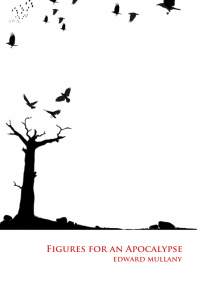 Figures for an Apocalypse
Figures for an Apocalypse
by Edward Mullany
Publishing Genius Press, 2013
198 pages / $14.95 buy from Publishing Genius
Rating: 7.5
Edward Mullany’s newest collection of prose poetry is titled from a book by Thomas Merton. Merton is known for being a Trappist monk and poet, but his poetry receives mixed reviews. In Commonweal, William Henry Shannon lambasts a vast majority of the volumes of Merton’s poetry as “mediocre or just plain bad”; however, Shannon concedes that amongst the thousands of lines of poetry “one will also find fine poetry there.”
In many cases, the mark of fine poetry is to appear effortless—and, perhaps, in some cases craftless. Edward Mullany’s newest poems seem to be nothing more than simple titles with surreal imagery acting as a sort of call and response. Take “The Statues of Weeping Women” for example: “Along empty highways they / were placed at equal / intervals.” That’s the whole poem.
Other pieces in the collection are seemingly plotless, page-length prose poems which simply describe everyday occurrences, as in “The Wrong Child” wherein a girl’s mundane day of school is described in exacting detail:
Or as in “Say No” which starts by saying READ MORE >
January 7th, 2014 / 4:36 pm
Brooklyn Poetry Summit Final Countdown
“As many of you have heard, we in Brooklyn (and its surroundings) are beginning to solidify the Brooklyn Poetry Summit, which will be taking place the weekend of April 18th of the coming year with more than 20 readers from all over the country with poetics both disparate and in close conversation with one another. We are hoping to be able to bring our readers into town without them incurring financial burden, and to help mitigate the financial stress that so often roadblocks meetings of this sort.
The summit’s goal is to provide a site for discourse, reading and listening whilst, of course, making similar provisions for partying with much vigor and refinement. As we are doing our best to stay away from any institutional support while still being able to bring all these poets to town without financial burden, we need support from everyone, especially to adjust for relative distances and financial concerns of our readers . So…donate, fast, furious, often, oftener…great “gifts,” even better future payoff…think of this as your retirement fund.
Summit Schedule (as of Jan. 6th, 2014)
Thursday, April 17:
BookThug Nation (Evening)
—erica kaufman
—Sherwin Bitsui
—Andrew Kenower
—Sara Wintz
Friday, April 18:
Unnameable Books (Evening)
—Sam Lohmann
—Sarah Dowling
—Nico Peck
—Tyrone Williams
Ugly Duckling Presse HQ (Night)
—Brandon Brown
—Roberto Harrison
—Anne Boyer
—James Yeary
—Tanya Olson
Saturday April 19:
Berl’s Poetry Shop (Evening)
—Chris Sylvester
—Holly Melgard
—Joey Yearous-Algozin
—Jordan Dunn
—Eddie Hopely
Location TBA (Night)
—David Abel
—Anna Vitale
—Dana Ward
—j/j Hastain
—Suzanne Stein


